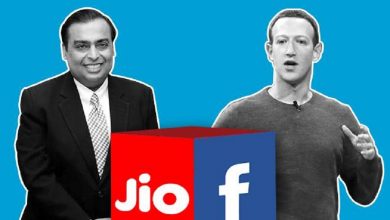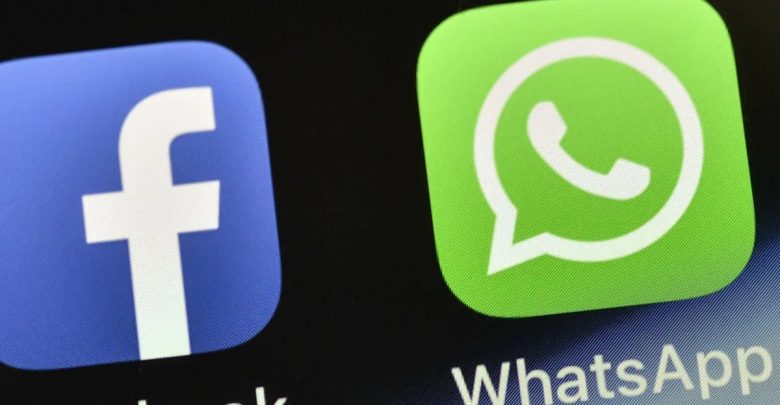
WhatsApp messenger has always been our daily chat application, and so friends, family, relatives, and loved ones would chat over WhatsApp either in a group, or individually. It became an app that no one could forget, that we didn’t realise other apps were around until recently when Facebook updated the new terms and conditions so that all WhatsApp data will be shared with Facebook. After Facebook set a date for the new terms, and privacy policy for WhatsApp, people started panicking and wondering what to do next. As usual, people already knew about Telegram, and many started flocking over to Telegram. But no sooner after this happened, Elon Musk posted a tweet “Use Signal” and that saw people flooding signal as Signal reported a really large influx of customers into their app. This added more fuel to the fire of Facebook’s declining stocks, and this could lead to a domino effect in which Facebook’s stocks decrease to close to zero in the near future.
Use Signal
— Elon Musk (@elonmusk) January 7, 2021
On 7th Jan, Elon Musk asked users to use signal, and this below is what happened ever since his tweet. The number of app installations went from 10 million to 50 million in a very short period of time. Telegram too has seen a boost in the number of installations, but nowhere as near as signal. This is a huge thing for Signal/Telegram, and a huge burden for Facebook.
How it started vs how it's going 😅 pic.twitter.com/ERiFpZUz6c
— Signal (@signalapp) January 14, 2021
So let’s take a short walk down memory lane about the founders of Whatsapp, and see how their app became the world’s most used today…
Jan Koum and Brian Acton met in 1997, and at the time, Brian was working as a software engineer at Yahoo. The two became friends after meeting up. After the meetup, Jan also joined Yahoo, as a Security and Operations Engineer. They continued working together until 2007 when they both quit their jobs on the same day. Then in early 2009, Jan bought an iPhone and he kept missing phone calls when he was at the gym. This became really bothersome, and he wanted to do something about it. So they both applied for jobs at Facebook, and were rejected.
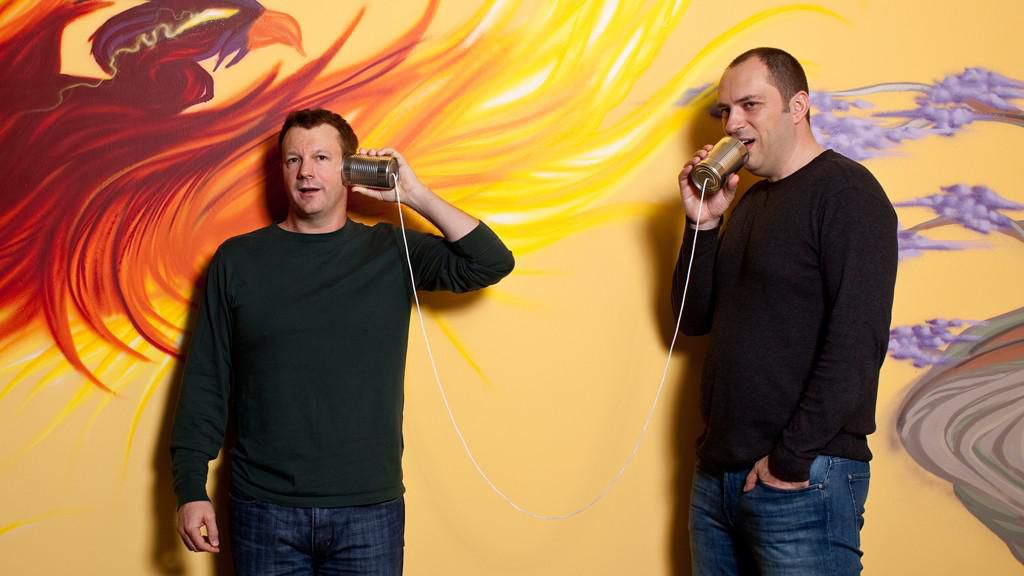
Eventually, with the frustration of his iPhone as well as being unemployed, it caused him to do something about his life. He made WhatsApp inc, and that’s how the app was born.
Struggles with keeping up with the app, and how they bounced back
Jan wanted to work on the app back-end, but was unable to do so, and that’s when his friend Alex Fishman introduced him to a Russian iOS app developer, Igor Solomennikov. A few months later, the app was approved by the Apple app store.
But then there were no downloads, and Jan was about to drop the idea when Brian backed him up and asked him to “give it a few months”. Brian’s commitment, encouragement, and positivity made him an important part of the new company. So, in November 2009, he joined Jan as co-founder.
A while later, iOS 3.0 introduced push notifications and Jan got what he always wanted. He and Igor updated the app, and got version 2.0 to the apple store. After that, the downloads started, and never stopped.
Jan later realized he created an amazing app – a social app, that connected users instantly, from anywhere in the world, for free. Unlike G-talk (which is now known as Google Hangouts), or Skype, WhatsApp users logged in with only their phone number. WhatsApp users did not require any username and password. In Jan’s own words “it just works”. But, more importantly, WhatsApp promised to be discreet. Their messages were not stored on the server, and their user data was kept safe.
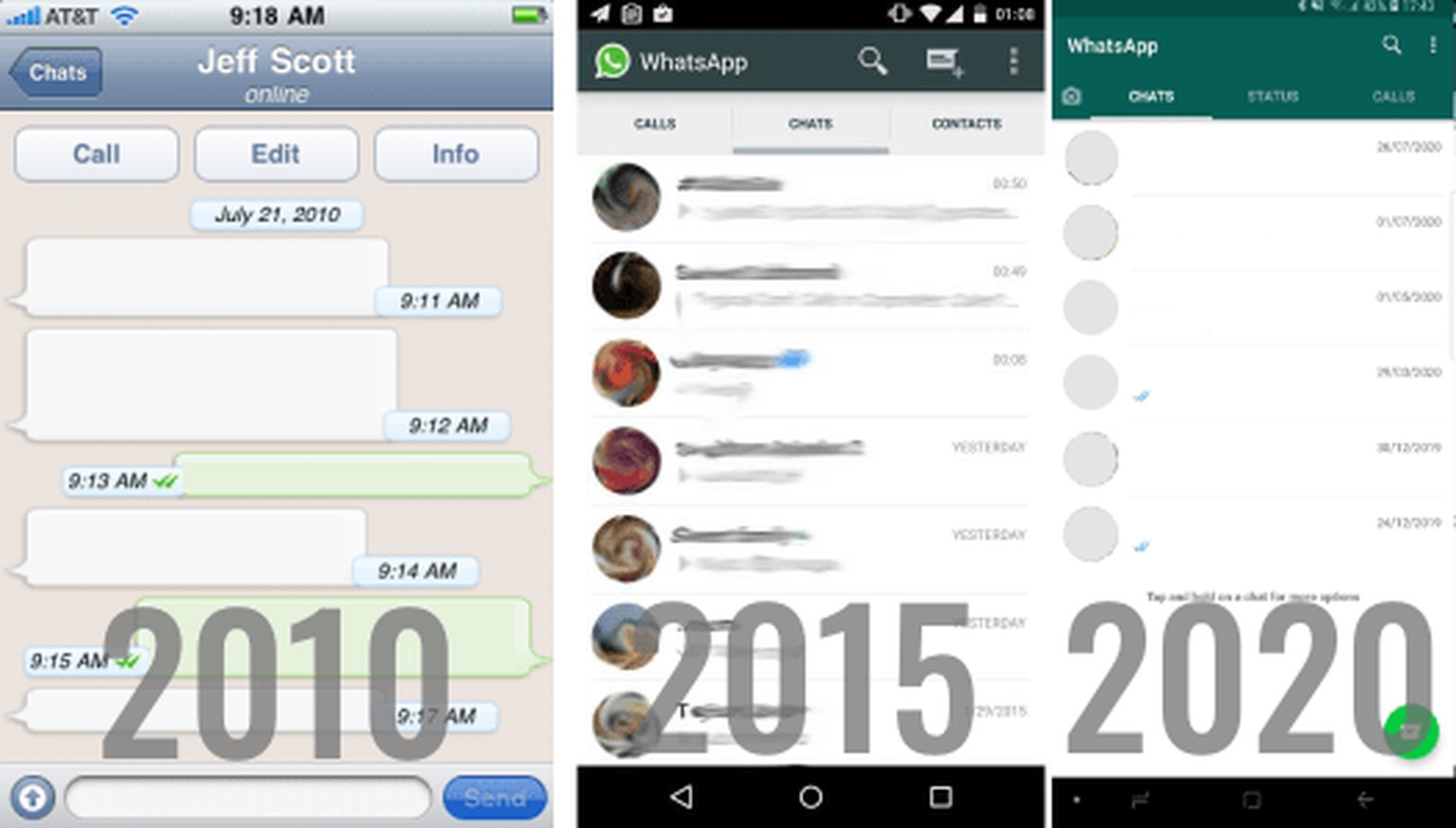
WhatsApp’s Baby Steps
During the last few months of 2009, WhatsApp racked up at least1 million users. All this took place while not spending a dime in advertising or promotion. The amazing and rapid user growth, combined with constant requests from different users convinced Jan to make WhatsApp cross-platform.
Since they had a “no ads, no games, no gimmicks” policy, they were unable to generate any revenue, so they decided to do something about it. So, in the first 6 months after the app’s launch, WhatsApp tried several payment plans. Finally, they found the perfect plan that seemed to work. It was a one time download fee to use the app. Later on, they then switched to a different strategy. They adopted a subscription-based plan, where users would get the first year free, after that it would be US $ 0.99 a year.
This strategy worked really well, and it helped them expand to around 70 countries by 2011. By then, the app was on various platforms like Android, iOS, Blackberry, and Windows Phone. This caused WhatsApp to grow at an even faster rate, and it broke the barrier of 2 million messages sent per day over the app in October 2011
The dreadful day thus came: Facebook buys WhatsApp
WhatsApp was expanding faster than any other instant messaging app at the time. So, by April 2013, they reached a 200 million users milestone. Just a year later, 300 million more users joined. But since the app stayed add-free, the company was running at a loss and they could not keep up with the costs. That was when it attracted the attention of Facebook.
So in Feb 2014, Facebook bought WhatsApp for 19.6 billion, which is more than the amount of 16 billion which WhatsApp originally demanded. The extra cash was incentive so that they could continue working under Facebook for an extra 4 years. But something happened before their 4 years was up. Read on to find out.
The few years of Facebook owning WhatsApp
After Facebook’s acquisition of WhatsApp in 2014 right until 2016, the number of users hit 1 billion, and Whatsapp dropped the subscription fees. Later that year, they even enabled end-to-end encryption system which was the most desired feature after the Cambridge Analytica scandal.
In the end, the time came when Facebook made their dreaded change… Facebook announced a change in its terms and conditions, stating that WhatsApp user data will now be combined with Facebook user data so that WhatsApp will start getting ads in the app. Their reasoning at the time was better targeting for advertisement. However, this went against the beliefs of both Brian and Jan, and, as a result, Brian quit in 2017 and Jan resigned the year after.
WhatsApp founder, Brian Acton’s important message
Brian Acton has warned us all the way back in 2019 about the privacy intrusion by Facebook, due to adverts and the reason why he left, by asking users to delete Facebook. Apparently, no one heeded his advice back then. Only right now, in 2021. But it’s never too late to make the change. Facebook has been spying on everyone’s data for a while, and no one realised it until today.
Facebook’s latest data sharing policy information pushed on 6th Jan 2021
On the 6th of Jan, WhatsApp users have started receiving an in-app notification regarding WhatsApp’s new terms and privacy policy. The notice talks about three main updates that will affect how WhatsApp will be processing your data and how businesses can use Facebook hosted services to store and manage their WhatsApp chats, and how WhatsApp will soon partner with Facebook and offer deeper integration across all the products. The message notification also reveals that these changes are going into effect on February 8th, later this year, and users will not have any choice but to accept these changes if they wish to keep using WhatsApp.
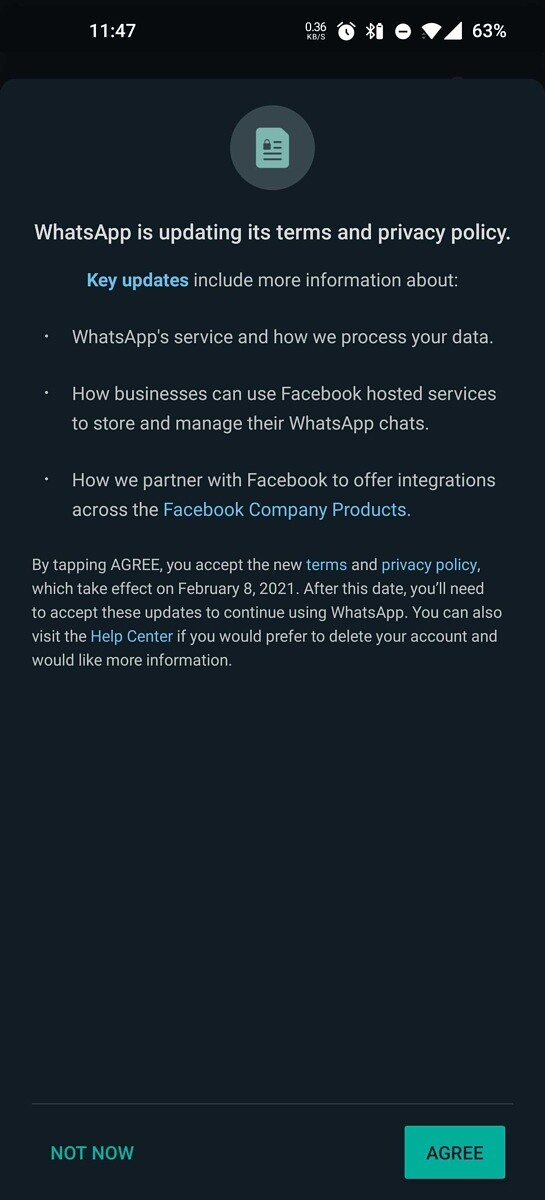
This is the most important part of the policy:
The information we share with the other Facebook Companies includes your account registration information (such as your phone number), transaction data, service-related information, information on how you interact with others (including businesses) when using our Services, mobile device information, your IP address, and may include other information identified in the Privacy Policy section entitled ‘Information We Collect’ or obtained upon notice to you or based on your consent.
The other parts of the privacy policy includes the following, on how other Facebook companies are going to use the information collected from WhatsApp.
- helping improve infrastructure and delivery systems;
- understanding how our Services or theirs are used;
- promoting safety, security, and integrity across the Facebook Company Products, e.g., securing systems and fighting spam, threats, abuse, or infringement activities;
- improving their services and your experiences using them, such as making suggestions for you (for example, of friends or group connections, or interesting content), personalizing features and content, helping you complete purchases and transactions, and showing relevant offers and ads across the Facebook Company Products; and
- providing integrations which enable you to connect your WhatsApp experiences with other Facebook Company Products. For example, allowing you to connect your Facebook Pay account to pay for things on WhatsApp or enabling you to chat with your friends on other Facebook Company Products, such as Portal, by connecting your WhatsApp account.
Soon after Facebook introduced the new privacy policy, people started leaving the app in droves!
Facebook started panicking and thus thought they were doing something about it. But it’s way too late for anything to be done by them as the trust is lost.
WhatsApp then decided to extend the change to the new privacy policy to May
After the global backlash with the new privacy policy terms, WhatsApp privacy policy will instead, take effect on 15th of May instead of 8th Feb. The updated policy terms were first announced via an in-app notification to users by WhatsApp, owned by Facebook, asking them to agree to the new terms by February 8 or lose access to their accounts.
“We’re now moving back the date on which people will be asked to review and accept the terms. No one will have their account suspended or deleted on February 8. We’re also going to do a lot more to clear up the misinformation around how privacy and security works on WhatsApp. We’ll then go to people gradually to review the policy at their own pace before new business options are available on May 15,” WhatsApp said in a blog update on Friday.
The new privacy policy caused an antitrust investigation in Turkey, asked to withdraw privacy by Indian Govt
According to a report by Bloomberg, the new terms and conditions have created some privacy concerns, which resulted in an antitrust investigation by Turkey’s antitrust board. The regulator talked about halting the implementation of new terms because they will result in “more data being collected, processed, and used by Facebook”.
In another report by The Hindu, A letter was sent to WhatsApp CEO Will Cathcart, stating that the government pointed out that the Indian users, who have not been given the option to opt out of data-sharing with Facebook companies, were being subjected to differential treatment when compared to their European counterparts.
“The privacy policy offered by WhatsApp to its European users specifically prohibits the use of any information shared with a Facebook company for that companies’ own purposes, while this Clause is not present in the privacy policy offered to Indian users. This differential and discriminatory treatment of Indian and European users is attracting serious criticism and betrays a lack of respect for the rights and interest of Indian citizens, who form a substantial portion of WhatsApp’s user base,” the letter said.
The government asked WhatsApp to reconsider its approach to respect the informational privacy, freedom of choice and data security of Indian citizens.
It remains to be seen if WhatsApp will revert the new privacy policy in these 2 nations in the days to come. But the damage has already been done.
Whatsapp went into damage control mode, and filled all the newspapers around the world with the new privacy policy saying that they respect and protect your privacy as a last ditch effort to save their users and stop them from switching.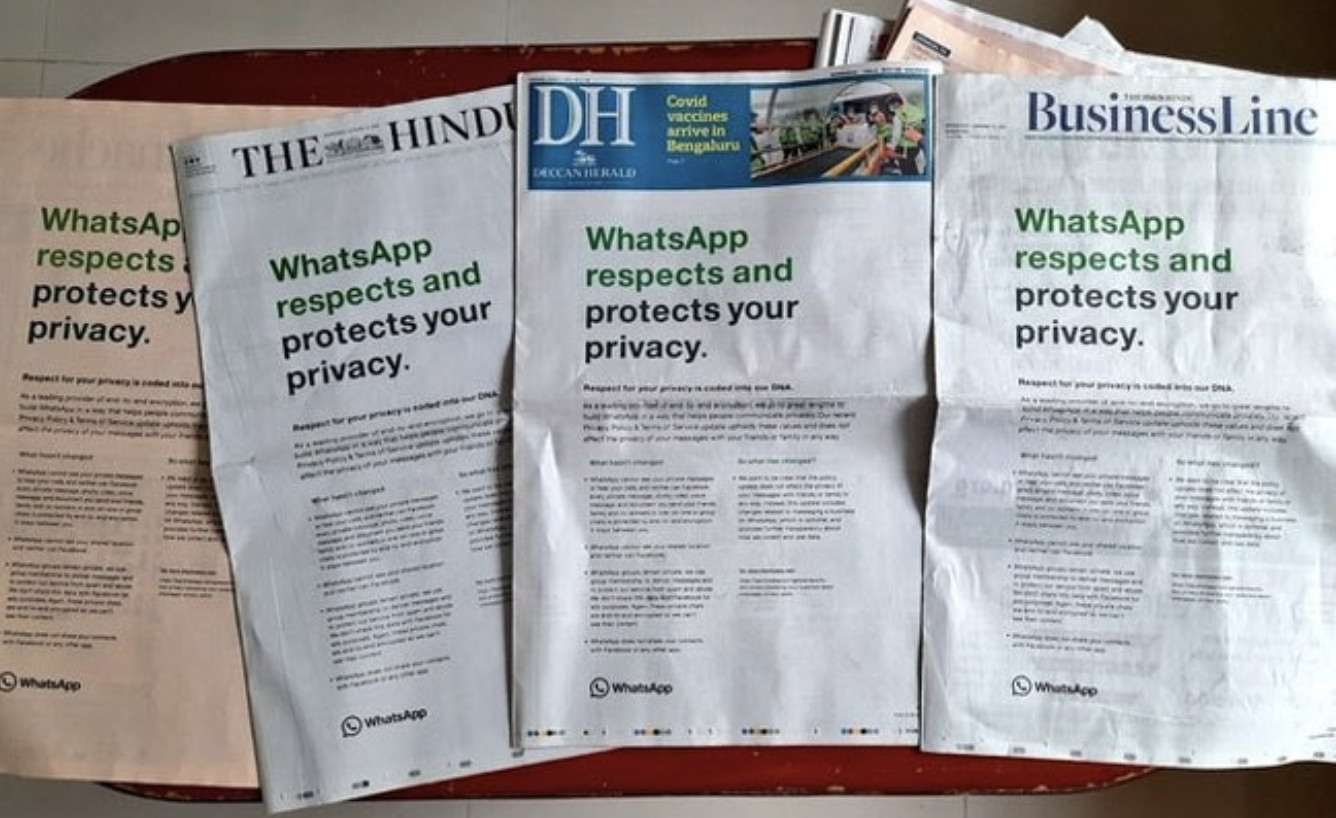
Do you think WhatsApp and Facebook can pull this off, or do you think they will go ahead with the new privacy policy on the 15th of May? Do let us know your thoughts in the comments below.


